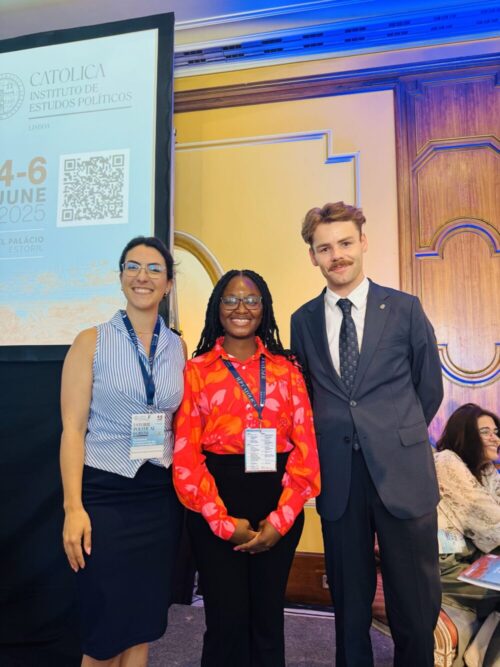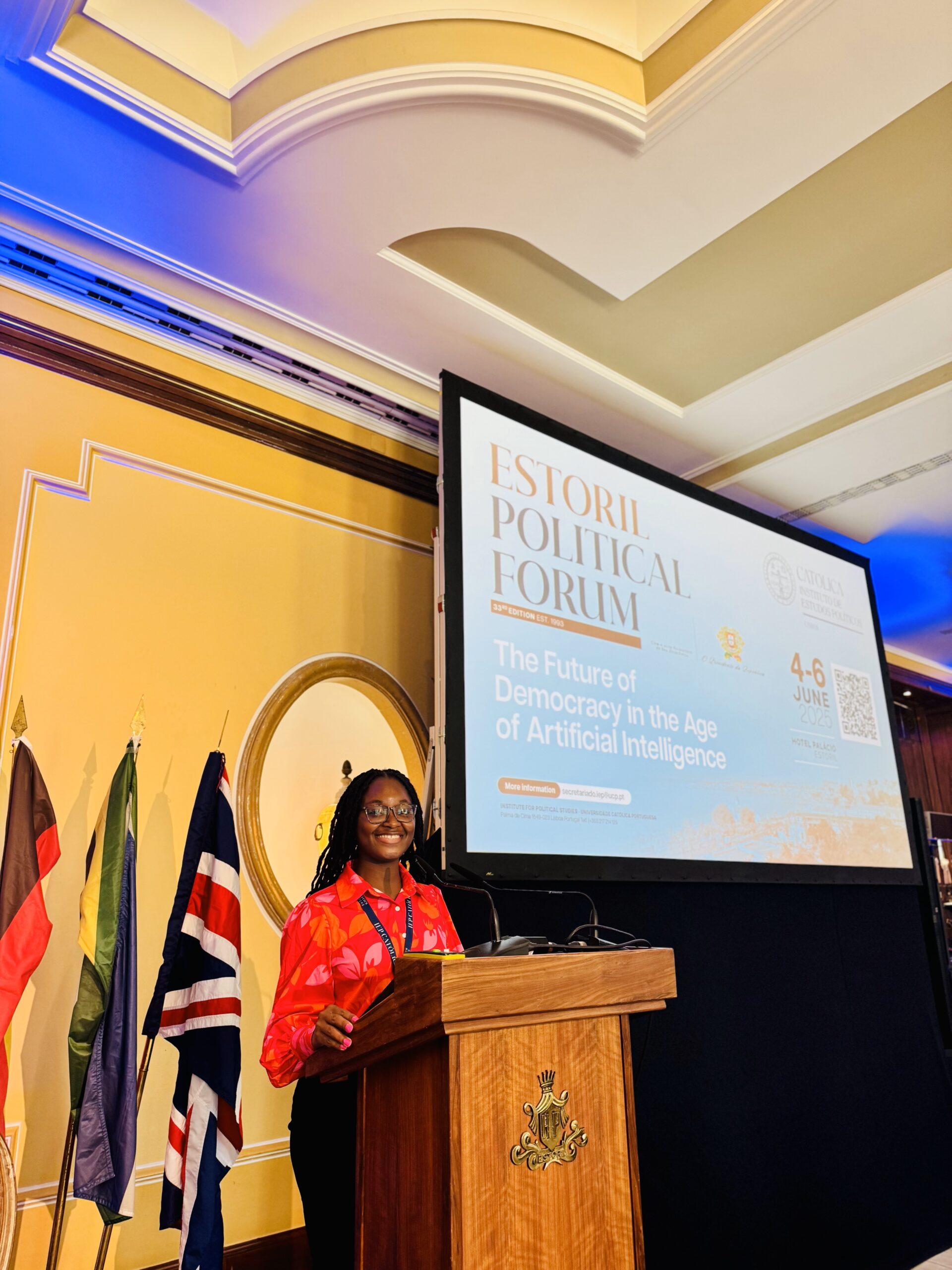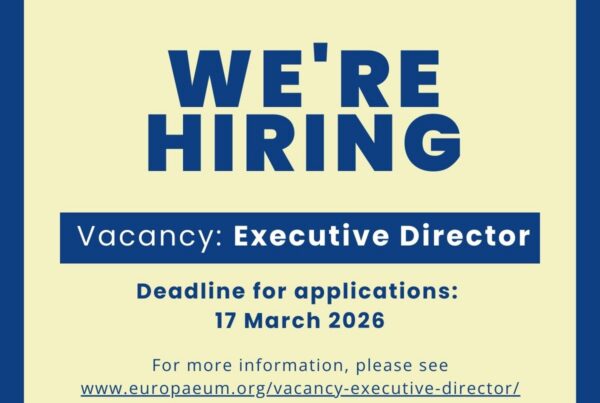
The Europaeum Debate
“This House believes that AI will destroy democracy”
6 June 2025 | Palácio Estoril, Estoril, Portugal
This year’s Europaeum Debate at the 33rd Estoril Political Forum, organised by the Institute for Political Studies at the Catholic University of Portugal, built on the event’s overarching theme: the impact of artificial intelligence on the democratic process.
Eight students from the Universidade Católica met with four from the Jagiellonian University and four from the wider Europaeum network (St Andrews, CEU, Geneva Graduate Institute, and Pompeu Fabra) to participate in debate preparation. Students discussed how to develop arguments for and against the motion and practiced the rhetorical strategies of debating in the Oxford style.
Six students took part in the debate itself with two more (Miguel Ángelo Martins and Diogo Magalhães, UCP) acting as Stewards. Speaking for the motion were Mário Vaz (UCP), Ana Ribeiro (UCP), and Jenny Lao (GGI). Against were Teresa Fernandes (UCP), Winifred Maduko (St Andrews) and Oliver Firth (Jagiellonian). An initial tally of opinions revealed widespread skepticism towards the motion, with the vote splitting 10 to 44 against.
Following a series of lively arguments, reproduced in the student summaries below, a further vote was taken. This produced an outcome of 15 in favour and 59 against. The motion was therefore defeated.
The Europaeum thanks the three Universidade Católica professors who provided expert commentary on the students’ arguments, Prof. Sonia Ribeiro, Prof. Lucie Calleja, and Prof. Paulo Sande; Dr Lucja Piekarska-Duraj, the Jagiellonian University’s debate co-ordinator; Prof. Mónica Dias, the Director of the Institute for Political Studies and the rest of the organising team; and Prof. Isabel Capeloa Gil, the Rector of the UCP.
The students’ arguments:

UCM student, Miguel Ramon Alonso.
FOR: Miguel Ramón Alonso (Pompeu Fabra)
Als are learning how to deceive. Fast. They’ve learned how to circumvent their shutdown; to cheat at chess when losing; to trick humans into skipping captchas. And we don’t comprehend how. We just give them a cookie when we like an output, and a slap when we don’t. Careless on how they got there.
Up to now, they’ve learned from us. From our thoughts. Our fears and dreams. Our morals. That’ll change. Rather sooner than later, they’ll learn from their own experiences, their own mistakes. But as of now, what have we taught them?
Look around. Us here, so lucid, trying to make each other understand that we understand how things work. Well, we don’t. And definitely, neither do our public servants. They know very little, other than playing game. Other than selling ideas; other than deceiving.
What are we trying to preserve here? Is it the status quo? Is it democracy? What democracy? Is it really a thing? The system is broken, because politics are broken. The strings of our so-called democracy are pulled by the same organizations that are now playing the AI wars. We are tracked, systematically. Every move that we take, every thought, every desire. In this way, they shape our thoughts, our desires. A tabloid here, a reel there, a post in between, and some moving news as dessert.
The same companies now claiming to save us from AI doom can’t stop pushing boundaries with little regard for future risks. Demis Hassabis, Google’s DeepMind CEO: “AGI takes my sleep.” Dario Amodei, Anthropic’s CEO: Right after presenting Claude 4 as a new, groundbreaking LLM, “Politicians should stop sugar-coating AI’s impact. They should tax each token by 3%, because I’m scared about inequality.”
A month ago, Anthropic published a paper on the Era of experience, on how experientised AIs will shape the world. 8 pages paper, 45 citations, a line and a half of future concerns. We drown in deceive. It makes us perpetually still. Feeling that we have an impact, while knowing, deep in us, that we don’t.
A few days ago, Meta was found to be thoroughly tracking all our movements by incredibly obscure, illegal means, using their Facebook and Instagram apps. No one cares much. We’ve been taught not to. A few months back, they were found to have pirated down the complete human bibliography to train their models. Yet we’re fined for downloading a song.
We want to save democracy from AI doom? Well, to start with, we should save it from us. From our frets. From power. From deception. Als are going to mature, to transition to autonomous agents, to experientised, all-in-one agents. We need to set guardrails. We need people in charge that truly grasp where we might be going. We don’t need politicians, we need leaders. We need to make people understand what’s at stake. We need, desperately, to generate a lot of public revenue to deal with despair, with inequality and displacement.
We need a tremendous push in public research to build open models that can be used, by humanity, for humanity. Not by the rich for the richer. We need to radically regulate social networks to stop them from being the main drivers of public opinion.
We need to move people, to stop treating ourselves as idiots. To give us back our thoughts, our objectivity, our will and our freedom.
I certainly don’t know how to.

St Andrews’ student, Winifred Maduko
AGAINST: Winifred Maduko (St Andrews)
I believe that AI will not destroy democracy but will however, amplify the democratic voices that have long been silenced in regions such as Africa. When AI is harnessed responsibly, it can strengthen democratic values especially in Africa where challenges and opportunities are unique.
One may argue that AI can be used for democratic manipulation, when in fact many democratic systems including African democracies already have political manipulations, corruption and electoral fraud existing independently of AI. So, you see, the problem is not AI, but it is governance and accountability.
Going on, AI is strengthening civic participation and accountability. In countries like Kenya, platforms powered by AI such as Ushahidi have allowed citizens to crowdsource and report election violence and fraud in real time. Many AI tools are being used by civil society organisations around the world to monitor political discourse and hold leaders accountable.
Furthermore, AI can be used to democratise access to information. In regions with low access to traditional education, AI driven platforms (like EdTech solutions in Rwanda and Ghana) can help in democratizing political education and civic awareness. Also, AI can translate political documents into local languages making democratic processes more inclusive in multilingual societies.
Additionally, youth driven innovation in AI is a democratic force. African youth-led startups are building civic tech tools using AI to track government budgets, improve transparency and promote e-governance. Example is BudgIt in Nigeria which uses data visualization and AI to promote government accountability.
Finally, the solution is not to fear AI, but to govern it, educate our societies, and build democratic resilience. AI will can help strengthen our democratic processes and reach more people beyond parliamentary walls.



